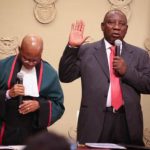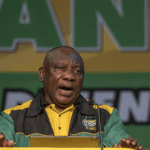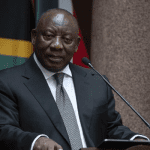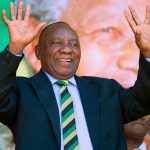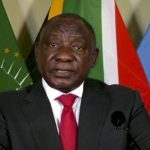South African President Cyril Ramaphosa has opened a new parliamentary term to mark the official start of his 11-party coalition government.
In his speech, Mr Ramaphosa outlined the new government’s plans for the first time since the coalition government took office.
Mr. Ramaphosa’s speech to MPs at Cape Town’s City Hall, a temporary location after a fire destroyed the Parliament building two years ago marked the official start of business for the new coalition, which brings at least ten parties together to rule Africa’s most industrialised country.
Ramaphosa stated that in spite of the political divisions within his broad coalition, his government was unified in addressing the three primary issues facing South Africa: the country’s crippling poverty and inequality, the unemployment crisis, and the breakdown of state institutions brought about by corruption and neglect, which has primarily been attributed to Ramaphosa’s own African National Congress party.
The speech was largely a call for unity across the political divide and was generally met by applause by lawmakers, an unsurprising result given so many of the parties represented in Parliament are now part of the governing coalition, including the main Democratic Alliance that was once the ANC’s fiercest political foe.
This also means South Africa also has a new official opposition, the newly-founded MK Party led by Jacob Zuma, a former South African president and ANC leader who has turned against it and emerged as the fiercest critic of Ramaphosa.
Ramaphosa, formerly a political prodigy of Nelson Mandela, is beginning his second and final five-year term, despite the fact that his once-dominant ANC suffered a humiliating election result, forcing him to rely on cross-party support to be reelected president by parliamentarians last month.
South African President Cyril Ramaphosa has opened a new parliamentary term to mark the official start of his 11-party coalition government.
In his speech, Mr Ramaphosa outlined the new government’s plans for the first time since the coalition government took office.
Mr. Ramaphosa’s speech to MPs at Cape Town’s City Hall, a temporary location after a fire destroyed the Parliament building two years ago marked the official start of business for the new coalition, which brings at least ten parties together to rule Africa’s most industrialised country.
Ramaphosa stated that in spite of the political divisions within his broad coalition, his government was unified in addressing the three primary issues facing South Africa: the country’s crippling poverty and inequality, the unemployment crisis, and the breakdown of state institutions brought about by corruption and neglect, which has primarily been attributed to Ramaphosa’s own African National Congress party.
The speech was largely a call for unity across the political divide and was generally met by applause by lawmakers, an unsurprising result given so many of the parties represented in Parliament are now part of the governing coalition, including the main Democratic Alliance that was once the ANC’s fiercest political foe.
This also means South Africa also has a new official opposition, the newly-founded MK Party led by Jacob Zuma, a former South African president and ANC leader who has turned against it and emerged as the fiercest critic of Ramaphosa.
Ramaphosa, formerly a political prodigy of Nelson Mandela, is beginning his second and final five-year term, despite the fact that his once-dominant ANC suffered a humiliating election result, forcing him to rely on cross-party support to be reelected president by parliamentarians last month.
South African President Cyril Ramaphosa has opened a new parliamentary term to mark the official start of his 11-party coalition government.
In his speech, Mr Ramaphosa outlined the new government’s plans for the first time since the coalition government took office.
Mr. Ramaphosa’s speech to MPs at Cape Town’s City Hall, a temporary location after a fire destroyed the Parliament building two years ago marked the official start of business for the new coalition, which brings at least ten parties together to rule Africa’s most industrialised country.
Ramaphosa stated that in spite of the political divisions within his broad coalition, his government was unified in addressing the three primary issues facing South Africa: the country’s crippling poverty and inequality, the unemployment crisis, and the breakdown of state institutions brought about by corruption and neglect, which has primarily been attributed to Ramaphosa’s own African National Congress party.
The speech was largely a call for unity across the political divide and was generally met by applause by lawmakers, an unsurprising result given so many of the parties represented in Parliament are now part of the governing coalition, including the main Democratic Alliance that was once the ANC’s fiercest political foe.
This also means South Africa also has a new official opposition, the newly-founded MK Party led by Jacob Zuma, a former South African president and ANC leader who has turned against it and emerged as the fiercest critic of Ramaphosa.
Ramaphosa, formerly a political prodigy of Nelson Mandela, is beginning his second and final five-year term, despite the fact that his once-dominant ANC suffered a humiliating election result, forcing him to rely on cross-party support to be reelected president by parliamentarians last month.
South African President Cyril Ramaphosa has opened a new parliamentary term to mark the official start of his 11-party coalition government.
In his speech, Mr Ramaphosa outlined the new government’s plans for the first time since the coalition government took office.
Mr. Ramaphosa’s speech to MPs at Cape Town’s City Hall, a temporary location after a fire destroyed the Parliament building two years ago marked the official start of business for the new coalition, which brings at least ten parties together to rule Africa’s most industrialised country.
Ramaphosa stated that in spite of the political divisions within his broad coalition, his government was unified in addressing the three primary issues facing South Africa: the country’s crippling poverty and inequality, the unemployment crisis, and the breakdown of state institutions brought about by corruption and neglect, which has primarily been attributed to Ramaphosa’s own African National Congress party.
The speech was largely a call for unity across the political divide and was generally met by applause by lawmakers, an unsurprising result given so many of the parties represented in Parliament are now part of the governing coalition, including the main Democratic Alliance that was once the ANC’s fiercest political foe.
This also means South Africa also has a new official opposition, the newly-founded MK Party led by Jacob Zuma, a former South African president and ANC leader who has turned against it and emerged as the fiercest critic of Ramaphosa.
Ramaphosa, formerly a political prodigy of Nelson Mandela, is beginning his second and final five-year term, despite the fact that his once-dominant ANC suffered a humiliating election result, forcing him to rely on cross-party support to be reelected president by parliamentarians last month.
South African President Cyril Ramaphosa has opened a new parliamentary term to mark the official start of his 11-party coalition government.
In his speech, Mr Ramaphosa outlined the new government’s plans for the first time since the coalition government took office.
Mr. Ramaphosa’s speech to MPs at Cape Town’s City Hall, a temporary location after a fire destroyed the Parliament building two years ago marked the official start of business for the new coalition, which brings at least ten parties together to rule Africa’s most industrialised country.
Ramaphosa stated that in spite of the political divisions within his broad coalition, his government was unified in addressing the three primary issues facing South Africa: the country’s crippling poverty and inequality, the unemployment crisis, and the breakdown of state institutions brought about by corruption and neglect, which has primarily been attributed to Ramaphosa’s own African National Congress party.
The speech was largely a call for unity across the political divide and was generally met by applause by lawmakers, an unsurprising result given so many of the parties represented in Parliament are now part of the governing coalition, including the main Democratic Alliance that was once the ANC’s fiercest political foe.
This also means South Africa also has a new official opposition, the newly-founded MK Party led by Jacob Zuma, a former South African president and ANC leader who has turned against it and emerged as the fiercest critic of Ramaphosa.
Ramaphosa, formerly a political prodigy of Nelson Mandela, is beginning his second and final five-year term, despite the fact that his once-dominant ANC suffered a humiliating election result, forcing him to rely on cross-party support to be reelected president by parliamentarians last month.
South African President Cyril Ramaphosa has opened a new parliamentary term to mark the official start of his 11-party coalition government.
In his speech, Mr Ramaphosa outlined the new government’s plans for the first time since the coalition government took office.
Mr. Ramaphosa’s speech to MPs at Cape Town’s City Hall, a temporary location after a fire destroyed the Parliament building two years ago marked the official start of business for the new coalition, which brings at least ten parties together to rule Africa’s most industrialised country.
Ramaphosa stated that in spite of the political divisions within his broad coalition, his government was unified in addressing the three primary issues facing South Africa: the country’s crippling poverty and inequality, the unemployment crisis, and the breakdown of state institutions brought about by corruption and neglect, which has primarily been attributed to Ramaphosa’s own African National Congress party.
The speech was largely a call for unity across the political divide and was generally met by applause by lawmakers, an unsurprising result given so many of the parties represented in Parliament are now part of the governing coalition, including the main Democratic Alliance that was once the ANC’s fiercest political foe.
This also means South Africa also has a new official opposition, the newly-founded MK Party led by Jacob Zuma, a former South African president and ANC leader who has turned against it and emerged as the fiercest critic of Ramaphosa.
Ramaphosa, formerly a political prodigy of Nelson Mandela, is beginning his second and final five-year term, despite the fact that his once-dominant ANC suffered a humiliating election result, forcing him to rely on cross-party support to be reelected president by parliamentarians last month.
South African President Cyril Ramaphosa has opened a new parliamentary term to mark the official start of his 11-party coalition government.
In his speech, Mr Ramaphosa outlined the new government’s plans for the first time since the coalition government took office.
Mr. Ramaphosa’s speech to MPs at Cape Town’s City Hall, a temporary location after a fire destroyed the Parliament building two years ago marked the official start of business for the new coalition, which brings at least ten parties together to rule Africa’s most industrialised country.
Ramaphosa stated that in spite of the political divisions within his broad coalition, his government was unified in addressing the three primary issues facing South Africa: the country’s crippling poverty and inequality, the unemployment crisis, and the breakdown of state institutions brought about by corruption and neglect, which has primarily been attributed to Ramaphosa’s own African National Congress party.
The speech was largely a call for unity across the political divide and was generally met by applause by lawmakers, an unsurprising result given so many of the parties represented in Parliament are now part of the governing coalition, including the main Democratic Alliance that was once the ANC’s fiercest political foe.
This also means South Africa also has a new official opposition, the newly-founded MK Party led by Jacob Zuma, a former South African president and ANC leader who has turned against it and emerged as the fiercest critic of Ramaphosa.
Ramaphosa, formerly a political prodigy of Nelson Mandela, is beginning his second and final five-year term, despite the fact that his once-dominant ANC suffered a humiliating election result, forcing him to rely on cross-party support to be reelected president by parliamentarians last month.
South African President Cyril Ramaphosa has opened a new parliamentary term to mark the official start of his 11-party coalition government.
In his speech, Mr Ramaphosa outlined the new government’s plans for the first time since the coalition government took office.
Mr. Ramaphosa’s speech to MPs at Cape Town’s City Hall, a temporary location after a fire destroyed the Parliament building two years ago marked the official start of business for the new coalition, which brings at least ten parties together to rule Africa’s most industrialised country.
Ramaphosa stated that in spite of the political divisions within his broad coalition, his government was unified in addressing the three primary issues facing South Africa: the country’s crippling poverty and inequality, the unemployment crisis, and the breakdown of state institutions brought about by corruption and neglect, which has primarily been attributed to Ramaphosa’s own African National Congress party.
The speech was largely a call for unity across the political divide and was generally met by applause by lawmakers, an unsurprising result given so many of the parties represented in Parliament are now part of the governing coalition, including the main Democratic Alliance that was once the ANC’s fiercest political foe.
This also means South Africa also has a new official opposition, the newly-founded MK Party led by Jacob Zuma, a former South African president and ANC leader who has turned against it and emerged as the fiercest critic of Ramaphosa.
Ramaphosa, formerly a political prodigy of Nelson Mandela, is beginning his second and final five-year term, despite the fact that his once-dominant ANC suffered a humiliating election result, forcing him to rely on cross-party support to be reelected president by parliamentarians last month.



